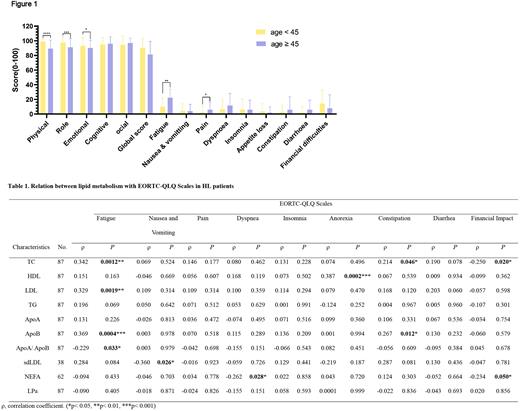Abstract
Background: Reduced quality of life (QoL) among cancer survivors has been identified as an impending problem due to the burden of chronic health conditions. It is critical to know the individualized risk of health conditions of each Hodgkin lymphoma (HL) survivor. Previous studies have suggested that lipid monitoring benefits HL survivors and improves survival. However, few studies have assessed the impact of lipid metabolism on QoL, specifically in HL survivors. Hence, the purpose of this analysis was to explore the correlation between lipid metabolism and QoL in HL patients.
Methods: The clinical data of 171 HL patients newly diagnosed between June 2010 and April 2022 were obtained from Shandong Provincial Hospital. QoL was assessed by the EORTC QLQ-C30, which is a standardized tool for assessing QoL in cancer patients. The association of QoL with lipid metabolism was evaluated using Pearson correlations. Univariate Cox regression analysis and multivariate Cox regression analysis were performed to evaluate the poor QoL of HL patients. p < 0.05 was defined as the borderline of statistical significance.
Results: The study included 171 patients aged 3-81 years (mean age 33), newly diagnosed with HL. Approximately 57.9% were male, more than 74% were younger than 45 years. 87 survivors were evaluable for QoL. The older with poorer physical function (p<0.0001), role function (p=0.005), emotion function (p=0.048), more fatigue (p=0.0061), pain (p=0.031) and dyspnea (p=0.089) (Figure 1). The response of ABVD therapeutic was not associated with the QoL in HL patients. Univariate Cox regression analysis showed that age and HDL were associated with an overall QoL summary score below the mean (94.83). Multivariate Cox regression analysis showed that age, HDL, sdLDL and Lp-PLA2 were independently predictive of an overall QoL summary score below the mean.
In terms of the relationship between lipid metabolism parameters and QoL (Table 1), TC was positively correlated with more fatigue (ρ=0.342; p=0.0012). Increasing HDL was associated with more anorexia (ρ=0.387; p=0.0002). Medium correlations (ρ>0.30) were observed between fatigue and LDL (ρ=0.329; p=0.0019) and ApoB (ρ = 0.369; p=0.0004). In HL patients with CD30+, poorer physical function was negatively correlated with increasing TC (ρ=-0.413; p=0.003), LDL (ρ=-0.402; p=0.0005) and ApoB (ρ=-0.316; p=0.0085). Increasing ApoB was associated with more fatigue (ρ=0.388; p=0.0094). Based on GSE17920, a nomogram for detecting individuals at high risk of fatigue was established. The differential lipid metabolism genes were found between the high and low-risk of fatigue groups.
Conclusions: Lipid metabolism in HL survivors is significantly associated with QoL. Thus, monitoring lipid metabolism has the potential to enhance QoL in HL patients.
Disclosures
No relevant conflicts of interest to declare.
Author notes
Asterisk with author names denotes non-ASH members.


This feature is available to Subscribers Only
Sign In or Create an Account Close Modal